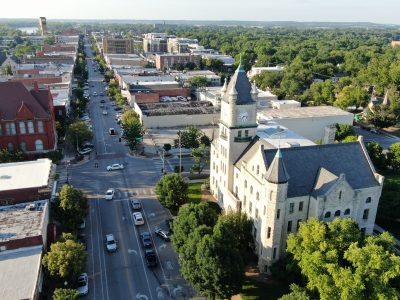Order in the court: Attorneys make concession in fight over judicial selection
Topeka ? With little fanfare, a group in the middle of the fight over state appellate judges has made a big concession.
The Kansas Bar Association’s governing board recently approved a resolution that maintains support for the merit selection of judges on the Kansas Supreme Court and Kansas Court of Appeals, but also says it’s OK with changing the way members are selected to a judicial nominating committee.
“We don’t need control of that,” said Lee Smithyman, president of the KBA. “That’s a really important change. It absolutely eviscerates the primary criticism of the system,” he said.
For two years, Gov. Sam Brownback, a conservative Republican, has sought more control in picking appellate judges, and now he has the Legislature in place that can give him the legislation to do that when the 2013 session starts Jan. 14.
The question is how far will the changes go?
Currently, judges on the Kansas Court of Appeals and justices on the Kansas Supreme Court are picked by the governor from a list of nominees provided by the Kansas Supreme Court Nominating Commission. After a judge or justice is appointed, he or she must stand for retention elections.
The Nominating Commission takes applications, interviews applicants, does numerous checks and forwards three names to the governor.
But conservatives have maintained that the Nominating Commission is dominated by lawyers who produce more liberal nominees.
And much of the criticism has focused on the make-up of the Nominating Commission.
It comprises nine members, five of which are elected by the approximately 10,000 members of the Kansas Bar Association. The governor appoints the remaining four members.
Stephen Ware, a professor at the Kansas University School of Law, has been a longtime critic of this setup, arguing that Kansas gives too much power to attorneys in the process of selecting appellate judges.
In an opinion piece he wrote last month, Ware said having a majority of the Nominating Commission picked in elections of members of the state bar “violates basic equality among citizens, the principle of one-person, one-vote.”
He added, “So the problem is not that Kansas has a nominating commission but how that commission is selected.”
Smithyman, president of the state bar, says the Legislature can change the make-up of the Nominating Commission if that’s what legislators want to do.
“However they want to do it,” he said. “Obviously, we hope attorneys would have some role, but if everyone says we are so dreadful, then so be it,” he said.
Smithyman said he believes the most important feature of the selection process is that it remain based on merit.
“The last thing we want is judges who have to run for election. If politics enters the judiciary, it’s like an infection,” he said. “We vote for the governor and the Legislature, but we need a non-political judiciary to enforce and interpret and to ensure the minority’s rights are respected by the majority,” he said.
When told what Smithyman said, Ware said that position represents movement by the state bar toward compromise.
But Ware said he has other problems with the current system, namely that the nominating commission makes its decision on who to nominate without a public vote.
To change the selection process for judges on the Kansas Court of Appeals would require a majority vote in the Legislature and the governor’s signature. A bill that would have let the governor nominate and Senate confirm judges on the appeals court has been approved in the House, but failed in the Senate last session. The incoming Senate, now that eight moderates have been replaced by conservatives, is more likely to approve such a bill.
To change the method of selecting Kansas Supreme Court justices would require a constitutional amendment which needs a two-thirds majority in the House and Senate before being put up for a vote of the public.
The following resolution was adopted recently by the Kansas Bar Association Board of Governors:
RESOLVED, that the Kansas Bar Association supports the merit selection system for appellate judges and justices, independent of how merit panel members are selected. The present application, interview, questioning and selection process provides the best available information to identify and select the most qualified appellate judges and justices, independent of political considerations.






